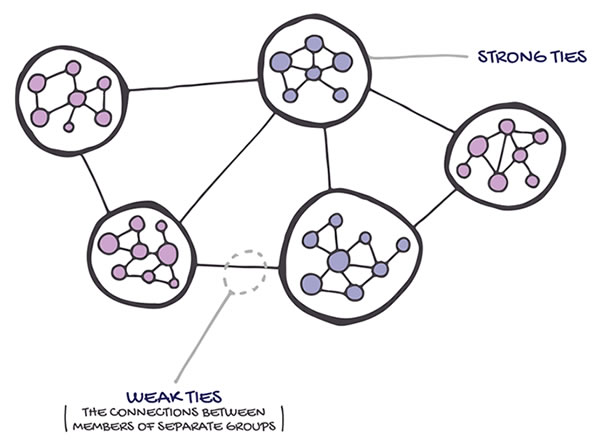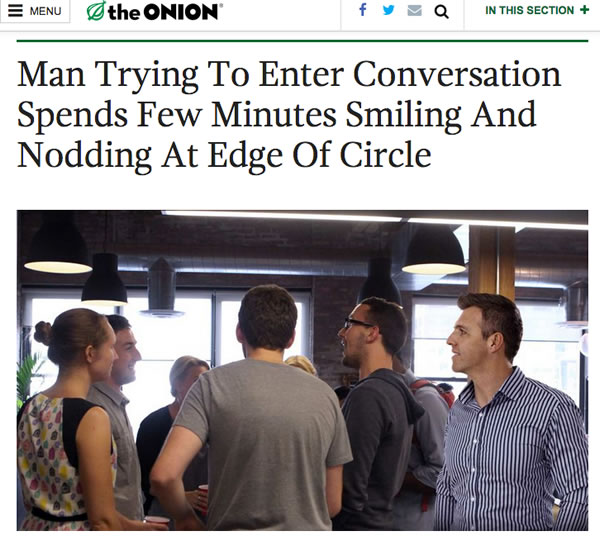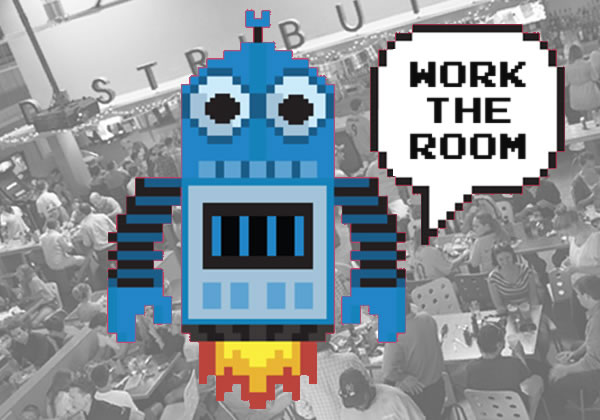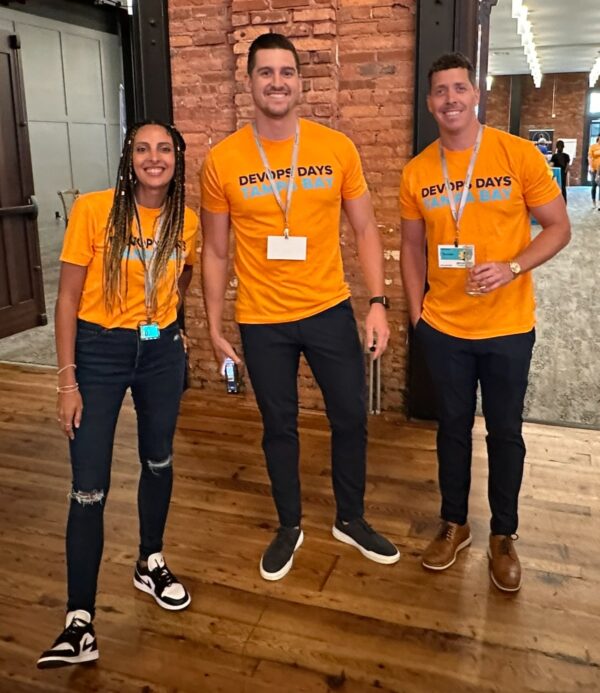It’s been my experience that some of the most important things I’ve learned and all the connections I’ve made at conferences didn’t happen at the presentations. Instead, they happened between presentations, when I worked the room in the hallways, lounges, lunches, and social gatherings, chatting with the speakers, organizers, and the other attendees.
If the phrase “work the room” sounds like sleazy marketing-speak and fills your head with images of popped collars and wearing too much body spray, relax. Working the room means being an active participant in a social event and contributing to it so that it’s better for both you and everyone else. Think of it as good social citizenship.

It’s especially important to talk to people you don’t know or who are outside your usual circle. Books like The Tipping Point classify acquaintances with such people as “weak ties”. Don’t let the word “weak” make you think they’re unimportant. As people outside your usual circle, they have access to a lot of information, people, and opportunities that you don’t. That’s why most people get jobs through someone they know, and of those cases, most of the references came from a weak tie. The sorts of opportunities that come about because of this sort of relationship led sociologist Mark Granovetter to coin the phrase “the strength of weak ties”.
This observation is so common that it’s given rise to “unconferences” like BarCamp, whose purpose is to invert the order of things so that the conference is more “hallway” than “lecture theatre”.

The best way to make weak ties at a conference is to work the room. If you’re unsure of how to work the room, I’ve got some tips that you might find handy…
Have a one-line self-introduction

A one-line self-introduction is simply a single-sentence way of introducing yourself to people you meet at a conference. It’s more than likely that you won’t know more than a handful of attendees and introducing yourself over and over again, during the conference, as well as its post-session party events. It’s a trick that Susan RoAne, room-working expert and author of How to Work a Room: The Ultimate Guide to Making Lasting Connections In-Person and Online teaches, and it works. It’s pretty simple:
- Keep it short — no longer than 10 seconds, and shorter if possible. It’s not your life story, but a pleasantry that also gives people just a little bit about who you are.
- Make it fit. It should give people a hint of the cool stuff that you do (or, if you’re slogging it out in the hopes of doing cool stuff someday, the cool stuff that you intend to do.)
- Show your benefits. Rather than simply give them your job title, tell them about a benefit that your work provides in a way that invites people to find out more. Susan RoAne likes to tell a story about someone she met whose one-liner was “I help rich people sleep at night”. That’s more interesting than “I’m a financial analyst”.
My intro these days is something along the lines of “I’m a rock and roll accordion player, but in my main side gig, I’m Tampa Bay’s Python/AI/tech advocacy guy, and in my side side gig, I put together the Tampa Bay tech events list and run a couple of coder meetups in town.”
How to join a conversation
You’ll probably see a group of people already engaged in a conversation. If this is your nightmare…

…here’s how you handle it:
- Pick a lively group of people you’d like to join in conversation. As people who are already in a conversation, they’ve already done some of the work for you. They’re lively, which makes it more likely that they’re open to people joining in. They’ve also picked a topic, which saves you the effort of having to come up with one. It also lets you decide whether or not it interests you. If they’re lively and their topic of conversation interests you, proceed to step 2. If not, go find another group!
- Stand on the periphery and look interested. Just do it. This is a conference, and one of the attendees’ goals is to meet people. Smile. Pipe in if you have something to contribute; people here are pretty cool about that.
- When acknowledged, step into the group. You’re in like Flynn! Step in confidently and introduce yourself. If you’ve got that one-line summary of who you are that I talked about earlier, now’s the time to use it.
- Don’t force a change of subject. You’ve just joined the convo, and you’re not campaigning. Contribute, and let the subject changes come naturally.
Feel free to join me in at any conversational circle I’m in! I always keep an eye on the periphery for people who want to join in, and I’ll invite them.
More tips

Here’s more advice on how to work the room:
- Come with goals. Decide what you want to achieve at DevOpsDays Tampa Bay. Is it making new contacts? Landing a job interview? Learning something new?
- Arrive early. This allows you to meet people in a less crowded, more relaxed setting.
- Take advantage of the Open Spaces in the afternoon. It’s your chance to be an active participant at DevOpsDays, and its smaller groups provide better opportunities for meaningful conversations.
- Listen! Yes, you’re there to talk, but so is everyone else. Make sure you listen to other people in the circle as they speak, and ask questions, too! One of the reasons you go to DevOpsDays is to get exposed to new ideas. As I said earlier, learning goes beyond the talks. Try to learn three new things at every event.
- Use social media. Follow the conference hashtag and connect with attendees online.
- Be more of a host and less of a guest. No, you don’t have to worry about scheduling or if the coffee urns are full. By “being a host”, I mean doing some of things that hosts do, such as introducing people, saying “hello” to wallflowers and generally making people feel more comfortable. Being graceful to everyone is not only good karma, but it’s a good way to promote yourself. It worked out really well for me; for example, I came to the first DemoCamp (a regular Toronto tech event back in the 2000s) as a guest, but by the third one, I was one of the people officially hosting the event.
- Move around. Don’t stay in one spot; circulate to meet people you might not otherwise meet.
- Beware of “rock piles”. Rock piles are groups of people huddled together in a closed formation. It sends the signal “go away”. If you find yourself in one, try to position yourself to open up the formation.
- Beware of “hotboxing”. I’ve heard this term used in counter-culture settings, but in this case “hotboxing” means to square your shoulders front-and-center to the person you’re talking to. It’s a one-on-one version of the rock pile, and it excludes others from joining in. Once again, the cure for hotboxing is to change where you’re standing to allow more people to join in.
- Put your stuff down. Carrying your bag or other stuff is a non-verbal cue that you’re about to leave. If you’re going to stay and chat, put them down. When you’re about to leave, take your stuff and start saying your goodbyes.
- Show and tell. Nothing attracts our eyes like shiny, whether it’s an interesting pieces of tech, a new book, a new t-shirt you’re fond of, or even some local knowledge, such a new restaurant, cafe, or bar that just opened. It’s why I carry my accordion around; I think of it as a device that converts curiosity into opportunity (and music as well). Got an interesting thing or idea? Got a neat project that you’ve been working on? Whatever it is, park yourself someplace comfortable in the hallway, show it off and start a conversation!
- Save the email, tweets and texts for later, unless they’re important.They’ll draw your attention away from the room and also send the message “go away”.
- Mentor. If you’ve got skills in a specific area, share your knowledge. Larry Chiang from GigaOm says that “It transitions nicely from the what-do-you-do-for-work question. It also adds some substance to party conversations and clearly brands you as a person.”
- Play “conversation bingo”. If there are certain topics that you’d like to learn about or people you’d like to have a conversation with, put them in a list (mental, electronic or paper) of “bingo” words. As you converse at the conference, cross off any of those topics that you cover off the list. This trick forces you to become a more active listener and will help you towards your learning goals. Yelling “BINGO!” when you’ve crossed the last item on the list can be done at your discretion.
- Follow up. Connect on LinkedIn or via email with people you meet.
- Be yourself. Authenticity helps form genuine connections.
